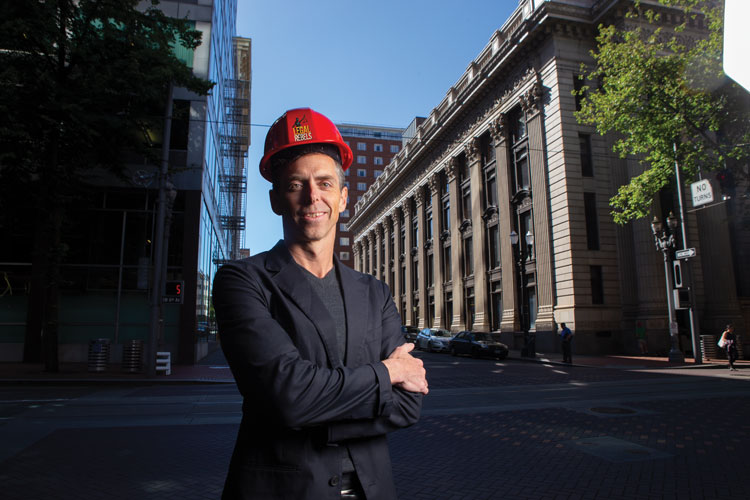
Photograph of Stephen Manning by Sung Park.
In the summer of 2014, as unaccompanied minor immigrants arrived at the border en masse, Stephen Manning was focused on a lesser-noticed but equally pressing problem: representing mothers with young children in family detention.
Like the minors, the mothers were mostly fleeing unchecked violence in Central America. And they were being deported much more quickly than usual. To make matters worse, there were hundreds of potential clients and only a handful of lawyers—who generally had to fly home at the end of the week.
So Manning imported something he thought would help: the Innovation Law Lab, a case management system he’d developed for collaboration at his own law firm, the Immigrant Law Group in Portland, Oregon. The system enables a kind of crowdsourcing, allowing teams to pick up pieces of cases as their skills and time allow.
Juliet Stumpf, a collaborator and friend of Manning’s, says this allowed the pro bono teams to represent literally everyone in detention. “And the only reason that worked was because the software enabled them to have that sophisticated level of client tracking and communication,” says Stumpf, a professor of immigration law at Lewis & Clark Law School in Portland.
It’s not just collaboration. The Innovation Law Lab also captures details about each case and puts them into a database in an attempt to identify—and then replicate—the characteristics of those cases that were successful. How much time was spent on which tasks? How often did someone talk to the client?
“We need to look at … those things that are actually done in cases, not just what lawyers think they do,” Manning says. “And then turn those into highly repeatable processes so that we can scale.”
Four years later, the Innovation Law Lab is doing that with thousands of cases nationwide. In border detention centers, its BorderX project brings together local advocates with volunteers from anywhere to collaborate on getting clients released. Those released to Atlanta or Charlotte, North Carolina, or Kansas City, Missouri, or Portland can also take advantage of the lab’s Centers of Excellence project, which seeks to win every winnable case using the same strategy. The data is also available to support “impact litigation,” which seeks to change the immigration law landscape.
It’s been working: In 2016, the lab got more than 30,000 people released from detention. That’s especially unusual in immigration, where there’s no right to a public defender and meritorious cases can be lost as a result. That’s why Manning sees this work as part of protecting the rule of law.
“Historically, the executive and Congress use their immigration power to do things that they couldn’t do elsewhere and then figure out how to export it,” he says. “The idea [is] to make sure that the Constitution and the law is followed in immigration adjudication, to prevent that sort of risky constitutional experimentation.”
If there’s a downside, it’s that Manning, 48, is very busy. The Innovation Law Lab has become his second full-time job while maintaining a full-time law practice and teaching as an adjunct at Lewis & Clark. Manning credits his husband, Jim Wilson, for making all this possible by taking care of him.
Stumpf, who teaches with Manning and is on the lab’s board, says Manning and Wilson also take regular breaks from work to climb mountains, which has a way of taking one’s mind off work. “If you’re ice climbing, the only thing you’re thinking about is not falling off the ice-covered mountain,” she notes. “So I think he comes back from those trips rejuvenated.”